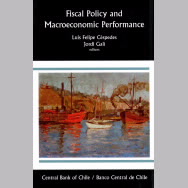Volumen 17: Fiscal Policy and Macroeconomic Performance
Publicaciones
Volumen 17: Fiscal Policy and Macroeconomic Performance
Descripción
Editores: Luis Felipe Céspedes; Jordi Galírelative neglect, fiscal policy is back at the center of the economics research agenda. The fiscal developments around the global financial crisis of 2007-2009 and its aftermath are undoubtedly a major factor behind that comeback. The large fiscal stimulus packages adopted by many countries in the face of large adverse shocks have triggered an unusually heated debate among academics, policymakers and commentators alike.
In ten contributions written by economists with a recognized expertise in the field, this book shed light on the key questions at the aftermath of crises: How effective is fiscal policy at stimulating the economy? What is the best design for a fiscal stimulus package? Should it put most of its weight on government spending increases or on tax reductions? Are automatic stabilizers enough or is a discretionary stimulus needed? How does fiscal policy interact with monetary policy? Is there room for coordination? What are the possible consequences for the economy of a large rise in the debt/GDP ratio? And those of the fiscal consolidations aimed at stabilizing that ratio? Finally, should countries adopt explicit fiscal rules?
Editores: Luis Felipe Céspedes; Jordi Galí.
Comentarios
Can fiscal policy get us quickly out of Great Recessions like the one we just had? Should we aggressively use fiscal stimuli or be prudent? How and how quickly do we reduce large deficits? What are the long run costs of large debts? These are some of the fundamental questions that this volume discusses with breath of coverage and depth of analysis. A first rate group of contributors deliver an essential reading for those interested in the fundamental theoretical and empirical issues in public finance.
Alberto Alesina, Harvard University
Traditionally, fiscal policy was a source of instability across most emerging markets economies, in particular in Latin America. However, in many emerging markets, during the global financial crisis the situation was different. Fiscal and monetary policies played a key role in averting a much deeper crisis and provided the necessary impulse for a strong and durable recovery. This book contains first-rate research by leading economists on the macroeconomics of fiscal policy. It covers issues such as the impact of fiscal policies on the business cycle, exchange rates, and labor markets among many important areas. It also provides very valuable guidelines and lessons on building a more effective and welfare-enhancing fiscal policy framework. It is a collection of great papers and it will become important reading material for academics and policymakers.
José De Gregorio, Universidad de Chile
The question of how fiscal policy contributes to macroeconomic stability is among the most important ones in Economics. It is of particular relevance for emerging economies, where observed business cycles are about twice as volatile as those in developed countries. In spite of its importance, a definite answer to this and other related questions continues to be elusive. This excellent volume gathers cutting-edge contributions to the theory and empirics of fiscal policy by leading researchers in the field. It is an essential reading for scholars and practitioners interested in macroeconomic policy for emerging and developed countries.
Martín Uribe, Columbia University
Volumen 17: Fiscal Policy and Macroeconomic Performance
Recuadros y gráficos

